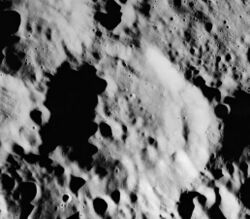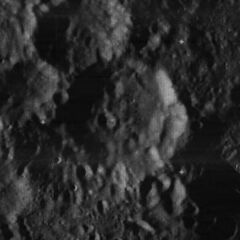Astronomy:Stark (crater)
 Apollo 15 mapping camera image | |
| Diameter | 49 km |
|---|---|
| Depth | 2.2 km |
| Colongitude | 187° at sunrise |

Stark is a lunar impact crater on the far side of the Moon. It lies to the southeast of the prominent crater Tsiolkovskiy, and north of Subbotin.
This is a heavily eroded crater with a jumbled outer rim and uneven interior. The pair of slightly smaller satellite craters Stark Y and Stark V are attached to the northwest and western exterior respectively, creating a triple-crater formation. (The designations Homer for Stark Y and Sappho for Stark V were suggested for these features, but the IAU rejected these names.) Within the interior of Stark is a small crater located just to the south of the midpoint.
In 2020, upon learning of Stark's support for the Nazi Party, Charles Wood, the chair of the Task Group for Lunar Nomenclature at the IAU, recommended to the IAU that the name "Stark" be replaced.[1] The name was dropped on August 12, 2020. Since then, this crater is officially unnamed.[2]
Satellite craters
By convention these features are identified on lunar maps by placing the letter on the side of the crater midpoint that is closest to Stark.
| Stark | Latitude | Longitude | Diameter |
|---|---|---|---|
| R | 26.3° S | 133.2° E | 21 km |
| V | 25.1° S | 133.3° E | 25 km |
| Y | 24.4° S | 134.0° E | 31 km |
See also
- Lenard (crater), another lunar crater whose name was dropped in 2020 due to Nazi connections.
References
- ↑ Philipp Ball (26 June 2020). "Astronomers unknowingly dedicated moon craters to Nazis". https://www.prospectmagazine.co.uk/science-and-technology/astronomists-unknowingly-dedicated-moon-craters-to-nazis-will-the-next-historical-reckoning-be-at-cosmic-level.
- ↑ "Stark (crater)". Gazetteer of Planetary Nomenclature. USGS Astrogeology Research Program.
- Andersson, L. E.; Whitaker, E. A. (1982). NASA Catalogue of Lunar Nomenclature. NASA RP-1097.
- Blue, Jennifer (July 25, 2007). "Gazetteer of Planetary Nomenclature". USGS. http://planetarynames.wr.usgs.gov/.
- Bussey, B.; Spudis, P. (2004). The Clementine Atlas of the Moon. New York: Cambridge University Press. ISBN 978-0-521-81528-4.
- Cocks, Elijah E.; Cocks, Josiah C. (1995). Who's Who on the Moon: A Biographical Dictionary of Lunar Nomenclature. Tudor Publishers. ISBN 978-0-936389-27-1. https://archive.org/details/isbn_9780936389271.
- McDowell, Jonathan (July 15, 2007). "Lunar Nomenclature". Jonathan's Space Report. http://host.planet4589.org/astro/lunar/.
- Menzel, D. H.; Minnaert, M.; Levin, B.; Dollfus, A.; Bell, B. (1971). "Report on Lunar Nomenclature by the Working Group of Commission 17 of the IAU". Space Science Reviews 12 (2): 136–186. doi:10.1007/BF00171763. Bibcode: 1971SSRv...12..136M.
- Moore, Patrick (2001). On the Moon. Sterling Publishing Co.. ISBN 978-0-304-35469-6. https://archive.org/details/patrickmooreonmo00patr.
- Price, Fred W. (1988). The Moon Observer's Handbook. Cambridge University Press. ISBN 978-0-521-33500-3.
- Rükl, Antonín (1990). Atlas of the Moon. Kalmbach Books. ISBN 978-0-913135-17-4.
- Webb, Rev. T. W. (1962). Celestial Objects for Common Telescopes (6th revised ed.). Dover. ISBN 978-0-486-20917-3. https://archive.org/details/celestialobjects00webb.
- Whitaker, Ewen A. (1999). Mapping and Naming the Moon. Cambridge University Press. ISBN 978-0-521-62248-6.
- Wlasuk, Peter T. (2000). Observing the Moon. Springer. ISBN 978-1-85233-193-1.
External links
- LTO-102D1 Stark — L&PI topographic map
 |

